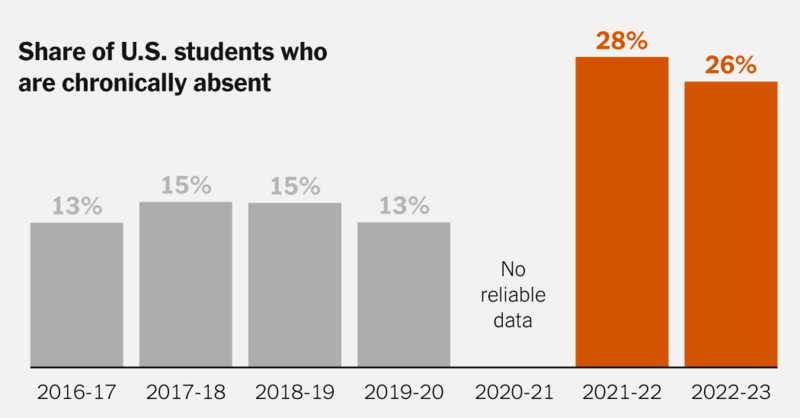Why School Absences Have ‘Exploded’ Almost Everywhere - via New York Times
MY SAY: American education has been primarily focused on the socialization of children. When you take out the "social" in that equation you have nothing. Stupid COVID protocols killed American education. The question is how to revive it? And I can assure you, it's not through "pajama day." The incentive has to be something valued by the child, but not something tangible. What? No candy, or junk food, or spirit day, or "no homework?" Are you nuts? Perhaps, but training children to appreciate knowledge is an art and a science. Child psychology, basic human needs and happiness can get nearly every child back into the classroom. School can be a place where a child's needs are met. That's good for the child and the parents. Being prepared to learn is the foundation of quality education. Food, water, shelter, safety, security, appreciation, discipline and love go a long way to creating an environment ripe for teaching and learning. Knowing how to motivate and manage children is essential. Motivation cannot be gimmicky or superficial. Kids lap it up, but see right through it and will only play along while they are getting their favorite lollipop or non-educational screen time. American educators must know what works, and then accept the pedagogy and policies that give students the best opportunity for excellence. Ready? Focus on foundational skills in reading, writing (communication), math, science, social studies. Opportunities in the arts. Real physical/health education, focused on the whole child with regard to a holistic approach to wellness, including fitness, nutrition, meditation and spirituality. Comprehensive education, including technical and vocational opportunities. an emphasis on testing, rigor and fun. If school isn't fun, or a place that makes kids happy, you're never going to return to acceptable absenteeism (above 90 percent). We know separating the genders works, even if there's a 5 percent increase in learning, it's worth it. Uniforms work. Double periods work. Good nutrition works. Frequent movement breaks work. Rules work. Enrichment works. Kids do better in school when they are engaged in extracurricular activities. Sitting in a circle works. Less screen time and more interpersonal interaction works. Fewer distractions in the classroom works. Professional educators who keep their personal feelings, opinions, preferences and lives private works. Respecting oneself and others works. Cooperative group activities work. And on and on. We know this, but ignore most of it, at our own peril.



 Education
Education


